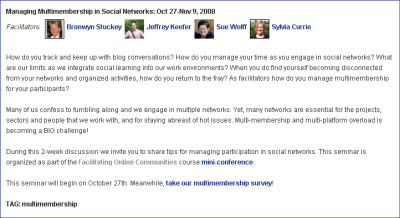How time flies!
Week 6 of the online class I am taking, Facilitating Online Communities, is just finishing, and our assignment is to search out an online community and identify the features of why it is one. To be fair, the assignment is a little more involved, but this is the part I am planning to focus upon.
 SCoPE jumps to mind. Sylvia Currie, one of my colleagues at a distance who is also taking this class and with whom I have participated in several online events, is the community organizer of this wonderful online association.
SCoPE jumps to mind. Sylvia Currie, one of my colleagues at a distance who is also taking this class and with whom I have participated in several online events, is the community organizer of this wonderful online association.
When I started attending professional development workshops at this online community, with the by-line “SCoPE brings together individuals who share an interest in educational research and practice,” I really was rather new to the concept of online community. In fact, the only reason I attended after all is because I did not have any other available professional education and development opportunities at the time. I had no concept of it as a community, nor was that something I would have sought out even had I recognized it as one. At the time, I saw education and professional development as something that one (me) does independently to improve one’s own classroom experiences. I had no idea about the collaborative and connected power of getting people together who have some common interests and experiences to share and develop together. That is something that came about from attending a number of the SCoPE sessions where I gradually experienced these benefits.
I have learned and reflected a lot on online communities over the past couple of years, and am finally trying to put into words what identifying features I now think I am looking for in an online community:
- Similar Interests — I am looking for people who have some similar interests, whether professional interests, academic interests, hobbies, or the like. I find it easier to work with people I meet in SCoPE who have similar interests in online learning, qualitative research, and educational technology for adult education. That many of these people also are interested in professional development opportunities and gladly share what they have learned to help others (me) not re-invent the wheel is an added bonus.
- Passion for Work — A number of the people who I have met along the way and with whom I am always happy to share continued online opportunities and sessions are those who are not afraid to work for something they want. They have a passion for going above and beyond the minimum in order to have (and share) the best experiences they can toward similar and related goals.
- Active Communication — Good communication is one of those hidden factors that supports or dooms communities. Maintaining connections online, with the variety of social media and communication media available, can be a challenge at times, and those who communicate in ways that their listeners and colleagues can best hear their messages and reply are those who are most effective at building and supporting communities.
There indeed may be other factors to consider, and for them and for other perspectives on this topic I will in turn look at my own community in this class, such as Illya Arnet-Clark, Mike Bogle, Nellie Deutsch, Barbara Dieu, and Amy Lenzo. What better resources than colleagues considering some of the same issues?
To end this thinking here, I suppose facilitating these factors involves the similar interests, passion, and communication that I listed above. Of course, organization and time management and project planning and staying current are also important. This reminds me of the Technology Stewardship discussions that other colleagues, John Smith, Nancy White, and Etienne Wenger, have been building and sharing with the larger community.
I think I have a lot of good examples to continue to learn from!
 I just learned about a new 3-week online seminar that just began at SCoPE: Re-Thinking E-Learning Research. I purchased this text after reading about it earlier in the year, and this is a great opportunity to begin reading it, especially given that my doctoral studies are in E-Research and Technology Enhanced Learning. As I take such a broad view of what elearning and e-research are, this session may be just the thing I am looking for.
I just learned about a new 3-week online seminar that just began at SCoPE: Re-Thinking E-Learning Research. I purchased this text after reading about it earlier in the year, and this is a great opportunity to begin reading it, especially given that my doctoral studies are in E-Research and Technology Enhanced Learning. As I take such a broad view of what elearning and e-research are, this session may be just the thing I am looking for.


